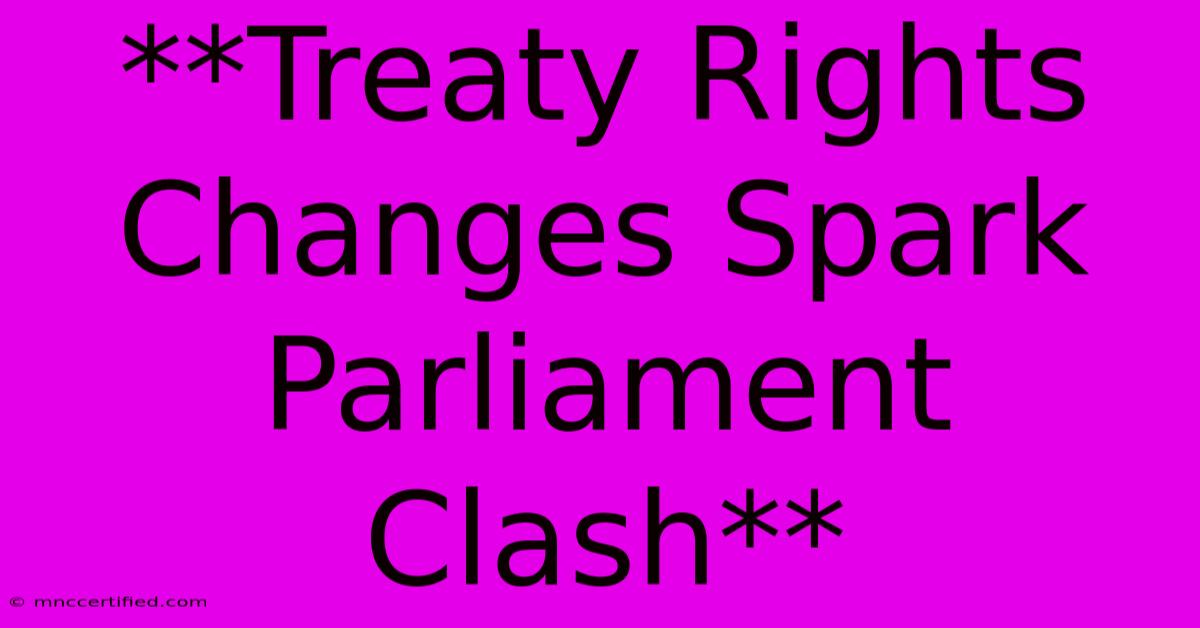**Treaty Rights Changes Spark Parliament Clash**

Table of Contents
Treaty Rights Changes Spark Parliament Clash
The proposed amendments to the Indigenous Treaty Rights Act have ignited a fierce debate within Parliament, pitting government promises against deeply held concerns about potential erosion of Indigenous sovereignty. This clash underscores a fundamental tension: balancing the nation's economic development with the inherent rights and self-determination of Indigenous communities.
The Heart of the Matter: Proposed Amendments
The core of the controversy lies within the specific amendments proposed to the Indigenous Treaty Rights Act. While the government frames the changes as clarifying existing legislation and streamlining administrative processes, Indigenous leaders and opposition parties argue that the amendments significantly weaken treaty protections. Key points of contention include:
-
Resource Development: Amendments related to resource extraction on treaty lands have raised significant concerns. Critics argue that the proposed changes prioritize corporate interests over Indigenous consultation and consent, potentially leading to exploitation of land and resources without meaningful Indigenous participation. This directly challenges the principle of free, prior, and informed consent (FPIC), a cornerstone of international Indigenous rights standards.
-
Environmental Regulations: Proposed alterations to environmental impact assessments raise fears that projects impacting treaty lands will receive expedited approval processes, bypassing vital Indigenous input and environmental safeguards. This lack of robust environmental review mechanisms threatens both the environment and the traditional livelihoods of Indigenous communities dependent on it.
-
Dispute Resolution: Changes to the dispute resolution mechanisms are also a major point of conflict. Opponents fear that the amendments shift the balance of power away from Indigenous communities, making it harder for them to challenge government decisions or corporate actions impacting their treaty rights. The accessibility and fairness of dispute resolution processes are vital for safeguarding Indigenous sovereignty.
Parliamentary Backlash and Public Outcry
The proposed amendments have faced strong opposition not only from Indigenous leaders and organizations but also from various opposition parties. Parliamentary debates have been highly charged, with passionate speeches highlighting the potential consequences of eroding treaty rights. This has led to widespread public outcry, with protests and demonstrations taking place across the country. The key arguments raised against the amendments include:
-
Breach of Trust: Critics accuse the government of betraying the trust placed in them by Indigenous communities, arguing that the changes contradict past commitments to reconciliation and self-determination.
-
Legal Challenges: Concerns have been raised about the potential for legal challenges to the amendments, arguing that they may violate constitutional protections for Indigenous rights and international human rights law.
-
Long-term Consequences: Opposition parties and Indigenous groups warn of long-term detrimental effects on Indigenous communities, including increased poverty, environmental degradation, and further marginalization.
The Path Forward: Negotiation and Reconciliation
The current impasse underscores the urgent need for meaningful dialogue and compromise. Finding a solution requires a genuine commitment to reconciliation, moving beyond superficial gestures towards substantive action that respects Indigenous rights and self-determination. The path forward requires:
-
Genuine Consultation: Meaningful and respectful consultation with Indigenous communities is essential to ensure their voices are heard and their concerns are addressed. This goes beyond mere tokenistic consultations and requires a collaborative approach built on mutual respect and trust.
-
Respect for FPIC: Upholding the principle of free, prior, and informed consent is paramount. Any resource development or policy changes impacting treaty lands must prioritize Indigenous self-determination and consent.
-
Independent Review: An independent review of the proposed amendments is vital to ensure they are compliant with constitutional and international law, and that they genuinely protect Indigenous treaty rights.
The ongoing clash in Parliament highlights the complex and sensitive issue of Indigenous treaty rights. A fair and equitable resolution requires a commitment to true reconciliation and respect for the inherent rights of Indigenous communities. The future of these relationships and the well-being of Indigenous peoples hinges on a thoughtful and collaborative approach that prioritizes justice and lasting peace.

Thank you for visiting our website wich cover about **Treaty Rights Changes Spark Parliament Clash**. We hope the information provided has been useful to you. Feel free to contact us if you have any questions or need further assistance. See you next time and dont miss to bookmark.
Featured Posts
-
Nations League Italy France Matchday 5
Nov 15, 2024
-
Kolisi Back England Vs South Africa Rugby
Nov 15, 2024
-
Watch Greece Vs England Uefa Nations Live
Nov 15, 2024
-
Rfk Jr As Trumps Pick Whats His Record
Nov 15, 2024
-
Ana De Armas James Bond Movie Dress
Nov 15, 2024